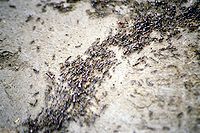
Photo from wikipedia
In this work, based on the gradient method and the relaxed CQ algorithm introduced by López et al. (Inverse Probl. 28 , 085004, 2012 ), we introduce two gradient-CQ algorithms… Click to show full abstract
In this work, based on the gradient method and the relaxed CQ algorithm introduced by López et al. (Inverse Probl. 28 , 085004, 2012 ), we introduce two gradient-CQ algorithms for solving the split feasibility problem in the framework of Hilbert spaces. The main advantage of the proposed method is not only that the variable stepsizes depending on the information from the current iterate not the operator norm are chosen but also that the metric projection onto half-spaces, which is convenient to be calculated, is taken into account. Then both weak and strong convergence are proved under some mild conditions. Finally, numerical experiments in signal processing reveal that the proposed algorithm is effective and outruns those of Yang, López et al., Gibali et al., and others.
Journal Title: Numerical Algorithms
Year Published: 2019
Link to full text (if available)
Share on Social Media: Sign Up to like & get
recommendations!